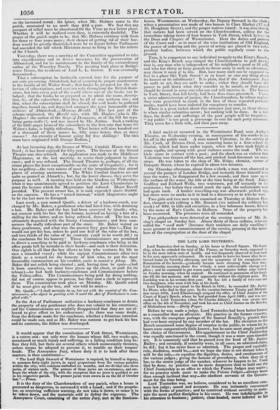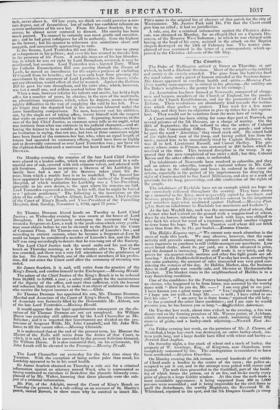THE LATE LORD TENTERDEN.
Lord Tenterden died on Sunday, at his house in Russell Square. His Lord- ship, when he attended the trial of Mr. Pinney, on Saturday week, appeared to be in the most infirm state of health, and was frequently observed to lean back in his seat, apparently exhausted. He was unable to leave his house after he re- turned home on Saturday afternoon, and the symptoms of his complaint—ia- fiammation of the bowels—gradually became more alarming from that time. Last Saturday morning about five o'clock, a most unfavourable change took place ; and he continued to get worse until twenty minutes before nine o'clock on Sunday morning, when he expired. He continued in possession of his facul- ties till the last moment, and died apparently without the slightest pain. His Lordship was in his seventy-first year. He has left a family of two sons and two daughters, who were with him at his death. Lord Tenterden was raised to the Bench in 1816; lie succeeded Mr. Justice Le Blanc, who died in that year. In the vacation between Trinity and Michael- mas terms 7818, Lord Ellenborough resigned the office of Chief Justice of the Court of King's Bench, where he had presided from April 1802; and was suc- ceeded by Lord Tenter den (then Sir Charles Abbott), who was sworn into office on the 4th of November, and took his seat as Chief Justice on the first day of Michaelmas term.—Dail;Paper.
Before he was made a judge, Lord Tenterden had been better known as a counsellor than an advocate. His practice in the former capacity, was, with the exception perhaps of Sir Samuel Romilly's, greater thou had ever been enjoyed by any member of the bar. His elevation to the Bench occasioned some degree of surprise to the public, to whom his la- bours were comparatively little known; but be soon most amply justified the choice of Government. His appointment to the Chief Justicesbip was equally sanctioned in the event, though it was a more ques tionable act. It is commonly said that he passed over the head of Mr. Justice Bailey; and certainly, if seniority were, in all cases, an admittedelaitn, he did; but it has never been so admitted. The proper and equitable rule, doubtless would be,—and we hope the time is not distant when it will be the rule,—to equalize the dignities, duties, and emoluments of the various judges ; giving the honour of precedency, when they sit at bar, to the senior judge of the number, whoever he happen to be. Until that be done, no practice can be more dangerous than to hold out the Chief Justiceship as an office to which the Puisne Judges may aspire; for no practice tends more to make the Puisne Judges—always more than enough inclined that way—the obedient servants of the Govern- ment for the time being. Lord Tenterden was, we believe, considered to be an excellent com- mon law judge; sound and accurate. He was intimately conversant with the forms of practice; and he contrived without severity to main- tain the most perfect discipline in his court. 'He was indefatigable in his attention to business; patient, clear-headed, never inferior to his
task, never above it. Of late years, we think we could perceive a cer- tain degree, not of favouritism, but of rather too confident reliance on certain authorities of his own bar. From Sir James Scarlett, for in- stance, he almost never ventured to dissent. His suavity has been much praised. To counsel he certainly was most gentle and consider- ate ; and he had great indulgence for all in authority, from the highest to the lowest; but his manner to witnesses was sometimes short and snappish, and occasionally approaching to rude.
In the Senate, Lord Tenterden did not shine. There was no grasp or enlargement in his politics ; and even his law seemed to forsake him in the presence of his Peers. A notable instaace of his law.blunder- ing, in which he was set right by Lord Brougham, occurred, it may be recollected, last session. Lord Tenterden was a bigoted Tory. When the Catholic Emancipation Bill was passing through the House of Lords, he moved an amendment for the express purpose of excluding O'Connell from its benefits ; and he u-as only kept from pressing the amendment by the argument of Lord Lyndhurst, that the clause, with- out any alteration, would effect all that he wanted. Against the Reform Bill he gave his vote throughout, and his voice also ; which, however, was hut a small one, and seldom reached below the bar.
When a man, however inferior his talents and merits, has held a high office for a number of years, he obtains, in the eyes of the multitude, an adventitious importance, which, when he departs, seems to throw mighty difficulties in the way of supplying the void he has left. Peo- ple forget that the departed had at his accession laboured under the same humiliating comparisons. No man, however vast his abilities, can, by the single act of taking office, invest himself with the respect that waits on power consolidated by time. Separating, however, in the case of the late Chief Justice, as common sense tells us we ought, what was intrinsic from what was extrinsic in his judicial character,—and al- lowing the former to be as notable as his eulogists can desire,—we have no hesitation in saying, that not one, but two or three successors might have been found at the common-law bar, who, when an equal length of tenure had operated its customary effects, would have been as highly and as deservedly esteemed as ever Lord Tenterden was ; nor have we the slightest doubt that such a successor has been found in Sir THOMAS DENMAN.



























 Previous page
Previous page